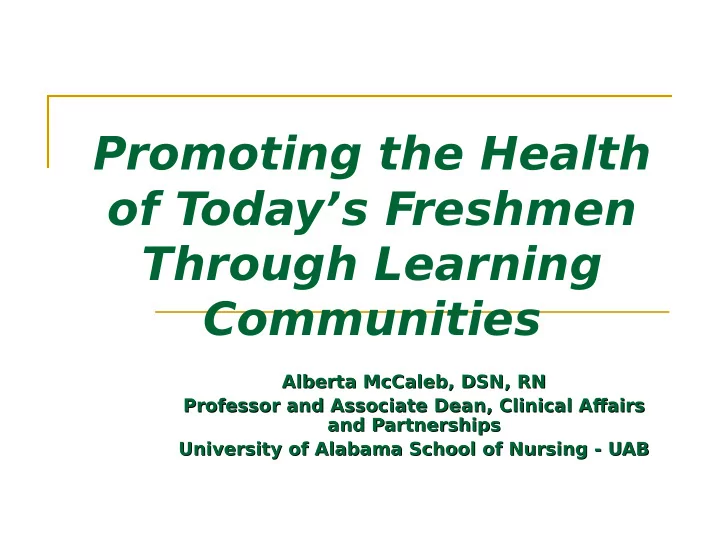

Promoting the Health of Today’s Freshmen Through Learning Communities Alberta McCaleb, DSN, RN Alberta McCaleb, DSN, RN Professor and Associate Dean, Clinical Afgairs Professor and Associate Dean, Clinical Afgairs and Partnerships and Partnerships University of Alabama School of Nursing - UAB University of Alabama School of Nursing - UAB
Presentation Objectives Describe the history of implementation of learning communities at the University of Alabama at Birmingham campus. Discuss the campus criteria for inclusion of content as a framework for learning community development. Describe the format used to build a self- assessment freshman seminar related to health.
Presentation Objectives Describe content related to the freshman seminar entitled “Body and Brain Power: Keeping Yourself Healthy.” Discuss integration of content within the learning community courses. Describe outcomes of the implementation process. Identify lessons learned and modifjcations to be made.
UAB’s Journey Work of the accreditation review team for the SACS visit (Southern Association of Colleges and Schools) Work of the Quality Enhancement Plan Committee (QEP) Appointment of Director of Core Curriculum Enhancement – Dr. Marilyn Kurata Request for proposals for Freshman Learning Communities (FLCs) approved by the Undergraduate Academic Programs Council
UAB’s Journey First Freshman Learning Communities (FLCs) implemented in Fall, 2006 Capacity for 200 of the 1410 freshman admitted to participate Self-selection of schedule during the Summer, 2006 orientation sessions
General FLC “Rules” Community consist of an anchor course – 3 credit hours, English Composition 101, and 1-2 selected math/science courses. Approximately 30% of the course content is related to QEP targeted competencies: ► Writing ► Quantitative Literacy ► Ethics and Civic Responsibility
Body and Brain Power: Keeping Yourself Healthy 70% of content in the FLC seminar focuses on a theme of the community. Theme concepts: Health, Self-care, self- assessment (getting to know your own health issues) and genetics/family health issues Health framework focuses on content such as: physical, psychosocial, developmental, and spiritual processes
Brain and Body Power: Content Specifjc Orientation & Intro to Health Self-assessment survey – Personal Health T our & Introduction to Fitness – UAB Recreation Center Staf Library Assignment – Health-related concepts such as self-help, stress response, learning styles, Maslow’s Hierarchy of Need, Family health, self-concept, etc.
Brain and Body Power: Content Specifjc Myers-Briggs Inventory Assessment Maslow’s Hierarchy of Need & Motivation Managing Stress The Body’s Response to Stress
Brain and Body Power: Content Specifjc Keeping Yourself Safe at College Avoiding Self-Abusive Behavior Cardiovascular Health Indicators Nutritional Health & Self- assessment
Brain and Body Power: Content Specifjc Blood Pressure, Cholesterol, and Glucose Assessment The Epidemic of Obesity Health Consequences of Obesity Women’s Health Issues
Brain and Body Power: Content Specifjc Men’s Health Issues Health Lifestyles Diabetes: Could it be me? Birmingham Health Images Family Health Assessment & Genogram
Integration of Content Between Courses: EH 101 Library assignment Autobiographical Essay Analyzing Images Essay
Integration of Content Between Courses: PY 101 Psychosocial content Motivation & Maslow’s Hierarchy of Need Theory Learning Styles and Personality
Measuring Outcomes Course Level – Student Performance ►Exams X 2…………………….40% ►Out of Class Activities…..20% ►Class Participation………..20% ►Final Project………………….20% ~80% of the participants passed with a C or better; 1 W; ~20% D/F
Measuring Outcomes Course Evaluation - SON * Teaching Efgectiveness Data Not Available * Weekly speaker evaluation summary -Relevant content (84 - 94%) -Efgective Teaching Methods (90 – 94%) -Knowledgeable, organized (63-88%) -Recommend speaker (63-100%)
Measuring Outcomes University Level →Item per item evaluation with focus groups at the University Level →Most item ratings clustered around “somewhat” likert scale →Highest rating: Library, getting to know other students, ability to meet new people, role of advisor, exercise impact, establishing personal goals, work together, retention, college recommendations
Lessons Learned Specifjc, concrete communication Class attendance policy Stagger some subject areas across weeks, not class periods Improve miscommunication about course Change Name Improve FLC team involvement
Contact Information Dr. Alberta McCaleb Professor and Associate Dean, Clinical Affairs and Partnerships University of Alabama School of Nursing University of Alabama at Birmingham 1530 3 rd Avenue South – NB 104C Birmingham, Alabama 35294 Telephone: 205-934-6535 Email: mccaleba@uab.edu
Recommend
More recommend